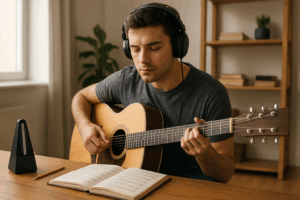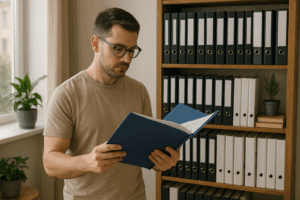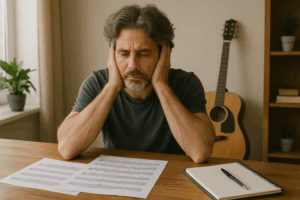Building confidence as a musician, especially when you’re just starting out, can be challenging. It’s common to feel uncertain about your abilities, particularly when faced with complex musical pieces or when playing in front of others. However, confidence is a skill that can be nurtured with the right mindset, strategies, and practices. In this article, we will explore practical steps to help you build your musical confidence, whether you’re performing, learning new techniques, or simply exploring your instrument.
1. Start with Small, Achievable Goals
When you’re beginning to learn music, it’s easy to feel overwhelmed by the amount of information and the complexity of the material. Setting small, achievable goals can help you build confidence gradually by allowing you to celebrate your successes along the way.
How to Set Effective Goals:
- Short-Term Goals: Start with simple goals, such as learning a few chords, mastering a basic scale, or playing a short, easy piece. Achieving these smaller goals will give you the motivation to continue learning.
- Track Your Progress: Keep a journal or log of your goals and progress. This will help you see how far you’ve come and remind you of your accomplishments, no matter how small they may seem.
- Reward Yourself: Celebrate every success, even the small ones. When you master a new skill or piece, take time to appreciate your effort. This positive reinforcement helps build confidence and motivation.
Setting and achieving small goals will give you a sense of accomplishment and slowly build your belief in your ability to progress.
2. Practice Regularly and with Purpose
One of the most effective ways to build confidence is through consistent and purposeful practice. The more you practice, the more comfortable you will become with your instrument and the techniques you’re learning. As you build muscle memory and familiarity, your confidence will naturally grow.
How to Practice Effectively:
- Focus on Problem Areas: Instead of just playing through songs or exercises, dedicate time to the parts that challenge you. Work slowly and focus on improving these areas. Progressing in these difficult sections will boost your confidence.
- Practice in Small Chunks: Rather than overwhelming yourself with long practice sessions, break your practice into smaller, focused intervals. This allows you to build concentration, maintain energy, and make consistent progress.
- Use a Metronome: Practicing with a metronome helps develop a solid sense of rhythm and timing, which in turn boosts your confidence when performing or playing with others.
With regular and intentional practice, you’ll become more comfortable with your instrument and skills, leading to greater self-assurance.
3. Challenge Yourself with New Music
One of the best ways to build confidence is by challenging yourself with new material. Stepping outside of your comfort zone and learning something new can feel intimidating, but it’s also a way to grow and prove to yourself that you’re capable of more than you think.
How to Challenge Yourself:
- Learn a New Song or Piece: Challenge yourself with a song or piece of music that is just beyond your current skill level. Start slow, and gradually increase the tempo as you become more comfortable with the material.
- Try a New Genre: If you typically play classical music, try learning a piece of jazz or pop. Exploring different genres helps you expand your musical abilities and adapt to new styles, which can boost your overall confidence.
- Perform for Yourself: Even if you’re not ready to perform in front of an audience, practice performing for yourself. Set a goal to play a song from start to finish, as if you were performing in front of others. This helps build performance confidence.
As you successfully conquer new challenges, you’ll gain the confidence to take on even bigger musical goals.
4. Embrace Mistakes and Learn from Them
It’s easy to become discouraged when you make mistakes, but it’s important to remember that mistakes are an essential part of the learning process. Every musician, no matter how skilled, makes mistakes—what matters is how you handle them and learn from them.
How to Embrace Mistakes:
- See Mistakes as Learning Opportunities: When you make a mistake, instead of getting frustrated, take a step back and analyze what went wrong. This is an opportunity to learn and improve.
- Don’t Be Afraid to Fail: Failure is not the opposite of success; it’s part of the process. Don’t let the fear of making mistakes prevent you from trying new things or pushing yourself.
- Stay Positive: Focus on your progress rather than your setbacks. Each time you make a mistake and correct it, you’re improving.
By embracing mistakes and learning from them, you’ll gain a stronger sense of resilience and confidence.
5. Perform Regularly, Even If It’s Just for Friends or Family
Performance can be one of the most nerve-wracking experiences for musicians, but it’s also one of the most effective ways to build confidence. Performing regularly, even in front of a small audience, will help you become more comfortable and self-assured when playing in public.
How to Perform Confidently:
- Start Small: Begin by performing for a close friend or family member. Playing in front of others, even in a low-pressure setting, helps you become more comfortable with the experience.
- Record Yourself: If you’re too nervous to perform live, record yourself playing and listen back. This helps you assess your playing without the pressure of an audience.
- Gradually Increase Your Audience: As you become more comfortable performing for small groups, challenge yourself to perform for larger groups or at local events. The more you perform, the more confident you’ll feel.
By performing regularly, you’ll not only improve your musical abilities but also your ability to handle nerves and perform with confidence.
6. Surround Yourself with Positive Support
Building confidence is much easier when you have a support system in place. Surround yourself with people who encourage and motivate you, and avoid negative influences that may undermine your confidence.
How to Find Positive Support:
- Take Music Lessons: A supportive teacher can help you stay on track and provide constructive feedback that boosts your confidence. They can celebrate your successes and guide you through areas where you need improvement.
- Join a Music Community: Connect with other musicians who are also learning. Sharing your experiences and progress with others can provide a sense of camaraderie and encouragement.
- Perform in Group Settings: Playing with others, whether in a band, ensemble, or jam session, can provide positive reinforcement and boost your confidence.
Being around people who support and encourage you will help you stay motivated and confident throughout your musical journey.
7. Visualize Your Success
Visualization is a powerful technique used by many successful musicians and athletes. By mentally rehearsing your performance or imagining yourself playing confidently, you can help reduce anxiety and increase your self-belief.
How to Visualize Success:
- Imagine Yourself Playing Confidently: Before a performance or practice session, close your eyes and visualize yourself playing flawlessly. Picture yourself feeling calm, composed, and in control.
- Use Positive Affirmations: Tell yourself that you are capable and confident. Positive self-talk can improve your mindset and help you overcome self-doubt.
Visualization and positive thinking can help reframe your mindset, making it easier to approach challenges with confidence.



